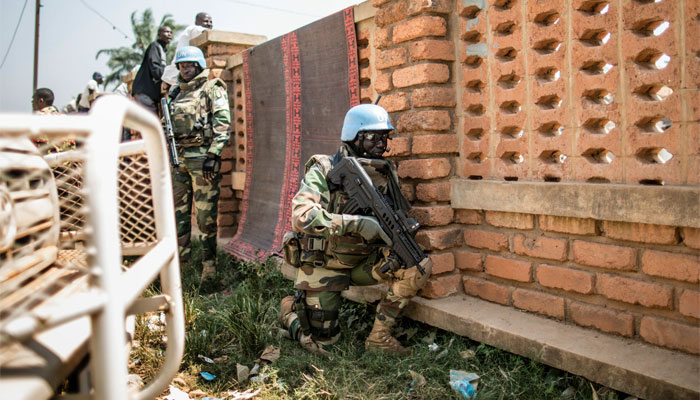A Senegalese soldier from the MINUSCA, the United Nations mission in Central African Republic, takes position to respond to heavy gunfire directed towards the Baya Dombia school where voters where gathered for the Constitutional Referendum in Bangui. AFP
- Rebels call for cancellation of referendum, polls
- Clashes break out in Bangui, problems in other towns
- New constitution would pave way for elections
Reuters/Bangui
Voters in Central African Republic cast their ballots on Sunday in a constitutional referendum seen as crucial to ending nearly three years of violence, as heavy fighting erupted in the capital amid a call by rebels for the process to be cancelled.
The former French colony descended into chaos in early 2013 when mainly Muslim Seleka rebels seized control in the majority Christian nation.
Their abuses led to reprisals by Christian anti-balaka militias, sparking inter-religious violence that has killed thousands and displaced nearly a million in a de facto partition.
Clashes broke out after UN peacekeepers from the MINUSCA mission, brought in to protect poll workers and voters, came under fire in PK5, an enclave of Muslims who have refused to flee the capital Bangui despite attacks by Christian militias.
Fighters armed with automatic weapons and rocket-propelled grenades launched repeated attacks in what MINUSCA's force commander General Bala Keita said was an attempt by "spoilers" to block the vote.
"Sometimes we stop the whole exercise to fight back and then we resume the voting. That's happened three or four times," he said. "It's a war zone. I think it's something extraordinary. We're helping people to vote while we're fighting the others."
Human Rights Watch said one person had been killed in PK5 on Sunday. Medical charity Medecins Sans Frontieres said it admitted 23 people with gunshot and grenade wounds during the day.
The expected approval of the draft constitution would pave the way for Dec. 27 polls to elect a new president and parliament, restoring democratic rule in the wake of two successive transitional governments.
The referendum also serves as a dress rehearsal for the vote, testing whether elections officials can overcome logistical and security challenges in a nation carved up by rival rebel and militia factions.
Residents of PK5, which was visited by Pope Francis during a trip to Bangui last month, marched to MINUSCA's headquarters earlier on Sunday to complain they were unable to cast their ballots.
"If we have these, it's so we can vote," said resident Karim Bashir Abakar, holding up his voter card. "But since last night there's shooting everywhere in PK5. They're trying to stop us from voting. We've had enough of guns. We want to go vote."
Rebel spoilers
Despite the deployment of the 11,000-troop strong MINUSCA last year and the presence of French soldiers, sporadic violence has continued.
In a statement distributed on Sunday, one of the main factions of the Seleka coalition said conditions, including the return of refugees, were not in place to allow for the polls to go ahead.
"CAR (Central African Republic) isn't ready to organise inclusive, democratic, credible, safe and transparent elections," it said. "A third transition with a new consensual team is needed, the elections ... and the referendum must be cancelled."
The government has rejected calls to postpone the polls, which have already faced repeated delays.
"We must have elections. This is the will of the people," said government spokesman Dominique Said Panguindji.
There were attempts to derail the vote in several parts of Bangui as well as in Kaga-Bandoro, Bossangoa and the northeastern town of Birao, said Diane Corner, the head of MINUSCA.
"There were some pretty dramatic events, but in a small number of places," she said. "In most of the country the situation has been pretty calm. The polls have been peaceful with long queues of people wanting to vote."
She said that, overall, turnout by the country's nearly 2 million registered voters had been high and there was a possibility that voting could be extended into Monday in areas where the process had been hobbled by logistical problems.
Central African Republic, which has reserves of diamonds, gold and uranium, has seen a succession of coups since becoming an independent nation in 1960, and the resulting instability has undermined state authority.
The Kimberley Process, a group was formed to prevent so-called blood diamonds from funding war, imposed an export ban on Central African Republic in 2013. However, UN investigators claim trade in illicit stones is still funding warring parties with the increasingly involvement of neighbours Cameroon and Chad.
The proposed constitution limits the power of the president and increases that of the parliament, creating a senate to compliment the already existing national assembly. It also establishes a Special Criminal Court to try serious crimes.

